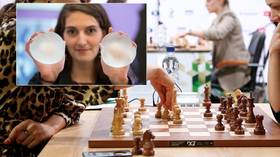Chess governing body derided for ‘misogynistic’ deal
However, record deal welcomed by others in the game

Sean Ingle
@seaningle
Fri 1 Oct 2021
For a sport that has struggled to attract female players, the news that chess has just agreed the biggest ever sponsorship deal for the women’s game would usually be universally welcomed.
But the decision of chess’s governing body, Fide, to partner with the breast enlargement company Motiva is facing growing criticism from some female players, who have called the decision “gross” and “misogynistic”.
The new deal was announced earlier this week, with Fide announcing: “The agreement will continue through 2022, a year that has been designated as ‘The Year of Women in Chess’.”
However, several female players, speaking to the popular site Lichess, believe the move is blunder. “Shouldn’t chess – a game reliant on brains rather than breasts – be distancing itself from that kind of reductive and misogynistic line of thinking?” one anonymous female player said. Another was even blunter, calling the deal “gross”.
Those comments were backed by another titled female chess streamer, who told the Guardian: “Fide does not have a strong track record in empowering women and I find it degrading and humiliating that an activity like chess, which is so cognitive, is being sponsored by a company which primarily profits from women’s insecurities. I highly doubt Fide would bring a penis enlargement company to sponsor the men’s World Championship.”
Chess has only 39 female grandmasters out of around 1,300 overall, but in recent years it has done far more to promote the women’s game. The success of the Netflix series The Queen’s Gambit has helped, with several top players, presenters and streamers – including Judit Polgar, Jovanka Houska, Jennifer Shahade and Alexandra Botez – also helping to broaden the game’s popularity.

Chess: Carlsen heads for Tour win as Nakamura moonlighting sparks debate
Some players believe Fide’s decision is a sacrifice too far. “I’ve already seen comments online from people saying that they hope prizes for women’s events will now include breast enlargement,” another anonymous titled female player said. “I’ve seen jokes citing specific top players’ names as those who could be improved by it. Chess has struggled with sexism in the past, and this has done nothing to help prevent that.” The players were speaking on condition of anonymity, Lichess said, because they often rely on Fide for invites to tournaments.
However, Fide’s new deal was welcomed by others, including women’s international master Sheila Barth Stanford. “We desperately need a sponsor,” the Norwegian said. “We play for less money than the men, which makes it more difficult to bet on chess. I hope it makes it easier for women to play professionally.”
Fide told the Guardian that it was the single largest corporate sponsorship ever signed specifically for women in chess, and the contract had been discussed by both the management board and the Fide council, “two bodies where women have a wider representation than they do in the chess community as a whole”.
It added: “Fide is not encouraging plastic surgery, but if an adult freely makes this choice, our organisation endorses Motiva, a company that has demonstrated its strong commitment towards women.”
‘It’s about brains, not breasts’: Chess bosses blasted after announcing breast enlargement sponsorship deal for women’s game

FIDE issued a carefully-worded PR release towards the end last month trumpeting the deal with Establishment Labs – owner of the Motiva brand which offers breast enlargement services.
“The partnership is the first-ever corporate sponsorship agreement specifically aimed at supporting women's chess events,” read the FIDE press release.
“The agreement will continue through 2022, a year that has been designated by FIDE as ‘The Year of Women in Chess’.”
However, the announcement soon came under fire from some female players who claimed the deal gave out the wrong impression.
“I wonder what’s the message FIDE wants to convey with this partnership,” one anonymous titled female player told popular chess website Lichess.
“We have a sport where men and women can compete on a level playing field which is also free from sexualized uniforms, and our ‘next great move’ is breast enlargement? That says a lot about FIDE officials' view of women.”
Another female player speaking on condition of anonymity added:“I’ve already seen comments online from people saying that they hope prizes for women's events will now include breast enlargement.
“I've seen jokes citing specific top players’ names as those who could be improved by it. Chess has struggled with sexism in the past, and this has done nothing to help prevent that. Where is FIDE punishing sexist comments, sexist attitudes?”
Another female titled player acknowledged that sponsorship was “hugely important for our game” but added that “FIDE should be more wise with their choice of sponsors, because it affects which message we are sending to the world.”
“I don't think breast implants is a proper message for our game; chess is a mental game and we care more about our brains than the shape of our body.”
One comment stated: “Shouldn’t chess – a game reliant on brains rather than breasts – be distancing itself from that kind of reductive and misogynistic line of thinking?”
Another concluded a diatribe against the deal by simply branding it “gross.”
In its defense, FIDE told The Guardian that it was “not encouraging plastic surgery, but if an adult freely makes this choice, our organization endorses Motiva, a company that has demonstrated its strong commitment towards women.”
Some also welcomed the move, with women’s international master Sheila Barth Stanford saying: “We desperately need a sponsor. We play for less money than the men, which makes it more difficult to bet on chess. I hope it makes it easier for women to play professionally.”
Fellow international master Elisabeth Paehtz of Germany said: “The main thing is support for chess. For me personally, I am happy if we have any sponsor for women in chess, and as long as it's not something connected to gender, racism, or drugs, or anything else like that, I would generally support that sponsor.”
Men still vastly outnumber women in the upper echelons of chess, with only 39 women being awarded the accolade of Grandmaster compared to around 1,300 players overall.
However, women’s chess has received a boost in recent years through the likes of smash-hit Netflix series The Queen’s Gambit as well as through popular female streamers such as Alexandra Botez.
The biggest name in the current game – Norwegian world champion Magnus Carlsen – admitted last year that: “Chess societies have not been very kind to women and girls over the years. Certainly there needs to be a bit of a change in culture.”
No comments:
Post a Comment